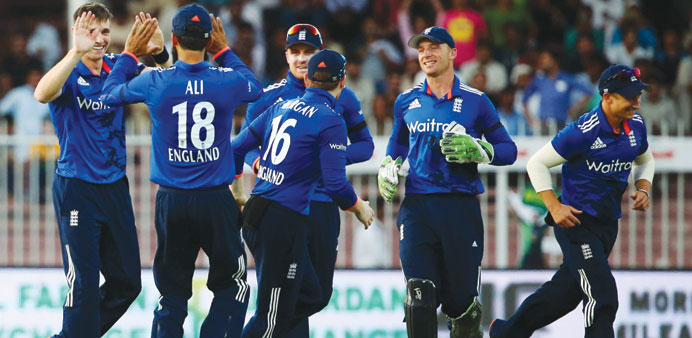England’s players celebarte after dismissing Pakistan’s Iftikhar Ahmed during the third ODI at the Sharjah Cricket Stadium. (AFP)
The Guardian /Sharjah
Jos Buttler returned to form at last as England defeated Pakistan by six wickets yesterday, to take an unbeatable 2-1 lead in the four-match one-day international series. England took six wickets for 29 runs as they bowled Pakistan out for 208 at the Sharjah Cricket Stadium.
Then, though, they still had to bat well on a wearing pitch – and James Taylor (67 not out) and Buttler (49 not out), so short of runs for much of this year, answered the call in an unbroken century stand.
Fittingly, Buttler hit the winning six in the 41st over, to finish just one run short of his first half-century in his last 22 international innings. For Taylor, it was a further endorsement of his claims in all formats, while for Buttler, with only 29 runs in his previous five ODI attempts and following his dropping as Test wicketkeeper, it was a merciful return to productivity.
Pakistan appeared to be on course for a much more substantial total, after choosing to bat first but lost their way alarmingly as England withstood early pressure and bowled and fielded well throughout. The hosts’ mishaps included three run-outs and a series of faulty shots into the deep as they kept making the same blunders, and for the second match running Chris Woakes (four for 40) bagged the best of the spoils despite some late hitting from Wahab Riaz.
Mohammad Irfan was then rewarded with just one success for an impressive opening spell, Jason Roy giving a simple catch to cover as he tried to push runs to leg off the giant left-armer from round the wicket.
Joe Root swept a full toss straight to deep square-leg as Zafar Gohar took a wicket with only his fifth ball in international cricket. But Alex Hales escaped on seven when Irfan failed to hold a looping chance in his follow-through from another leading edge, and Gohar could not hold a second caught-and-bowled opportunity – a brutal drive back at him when Eoin Morgan had just two.
Morgan and Hales shared a stand of 60. But as the ball began to turn ever more sharply for Gohar and Shoaib Malik, the third-wicket pair went in quick succession. Hales edged Gohar to slip, and Morgan was bowled making room to another that spun for Shoaib from round the wicket. At 93 for four, the balance was arguably tipping back to Pakistan. But Taylor and Buttler would not let it be so. Buttler had one telling early moment of fortune, when he yorked himself against Shoaib on nought and Sarfraz Ahmed missed the stumping. But he found growing confidence after two early reverse-swept fours off Gohar, and Taylor was assured and skilful on the way to a near run-a-ball 50 completed with a straight six off Shoaib.
Openers Azhar Ali and Babar Azam had got Pakistan off to a handy start. But Babar then mis-pulled Woakes to long-leg, and Azhar went in the first run-out mix-up. Mohammad Hafeez was the culprit, and did not adequately repay his captain before he got underneath a short ball – this time off David Willey – and holed out to deep square-leg five short of his 50.
Pakistan were still acceptably placed on 133 for three at the 30-over mark but when another set batsman got himself out, Sarfraz chipping Moeen Ali to deep midwicket, they had made their own trouble.
Mohammad Rizwan had only himself to blame for the second run-out, setting off casually for a faulty single to midwicket and unable to make his ground. Three wickets for eight became four for 13, when Iftikhar Ahmed mis-pulled another into the deep off Woakes – and Pakistan’s hapless cricket had blown a broadly favourable position.There were minor blips from England – a half-chance put down at cover by Willey when Hafeez had 36, a missed stumping by Buttler off Adil Rashid with Anwar Ali on six and a rare drop in the deep by Root to reprieve Wahab on 18.
But only Wahab’s escape was costly as he clubbed the majority of 47 runs for the last two wickets. England were nonetheless left with an achievable chase which, albeit after a wobble or two, proved within their range.

